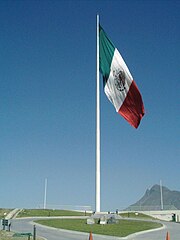This blog has also been posted in FPA’s Latin America Blog.
 Mexico in 2009 has become the recipient of at least half of the most famous biblical plagues starting in 2008. This past week brought yet another earthquake to Mexico, the second this month that received some media coverage outside the country. In addition to a full scale drug war, H1N1 flu, an economic crisis, political jockeying, immigration issues, drug related and everyday corruption and a persistent high level of poverty, Mexico and its leaders could claim to have more on their plate than Barack Obama has to deal with in the US today and for the rest of his Presidency.
Mexico in 2009 has become the recipient of at least half of the most famous biblical plagues starting in 2008. This past week brought yet another earthquake to Mexico, the second this month that received some media coverage outside the country. In addition to a full scale drug war, H1N1 flu, an economic crisis, political jockeying, immigration issues, drug related and everyday corruption and a persistent high level of poverty, Mexico and its leaders could claim to have more on their plate than Barack Obama has to deal with in the US today and for the rest of his Presidency.
Debates of where the blame for much of Mexico’s ills comes from has brought in voices from opposition within and outside of Mexico, its NAFTA partners, the WHO, IMF, World Banks and the UN itself. However in a general perspective has Mexico’s leaders performed worse than most other leaders in similar positions? Felipe Calderon’s government while blamed for igniting much of the drug conflict has tried to do more to fight narcotrafficking than any other Mexican leader in the past. Support for his anti-drug initiative has come from the US and Canada and South America, and while drug markets and demand has been claimed as the root cause of Mexico’s conflict by many in Mexico and by even Obama himself, NAFTA has become collectively aligned fighting against cartels that are well entrenched from Cancun to Vancouver. While NAFTA has always been exclusively a trade agreement, heavy cooperation in fighting drugs that come through many commercial and immigration sources also is the route of much of North America’s trade wealth boom since 1994. Markets which create demand for narcotics also demand other products from Mexico, Canada and the US which are not drug related, but may open for easier access to narcotrafficking across borders. The end result is that cooperation and addressing the drug issues are the only option in reducing the drug trade in North America by maintaining strong ties between the three NAFTA neighbors. I request that if other policy alternatives are a better option that readers voice their opinion.
H1N1, or Swine Flu as it was called before the WHO’s public relations people set out to change the definition did start in Mexico despite some claims otherwise in the country of its origins, and it is still in debate who is to blame. Blame has been knocked around quite a bit in this latest crisis, starting with slow action by Calderon and Mexico’s government to voice the issue abroad, leading to the WHO’s slow action in issuing alerts, leading to practices by Mexico’s agricultural industry and large multinationals, to claims of a poor health system in Mexico that is often a stereotype of many in developed countries abroad. The political fallout will determine the end result of the Swine Flu, but what should be noted is the effective actions taken by Calderon, Mexican public health officials, industry and citizens who completely shut down the most populated city in human history numbering almost 30 million and the other 70-80 million Mexicans who quietly kept indoors and patient over more than a week in order to end the spread of Swine Flu in Mexico and abroad. This enormous feat of public health control should be awarded to Mexico who despite having so many current problems, lack of funds, and large populations to deal with was still able to better handle H1N1 than many developed countries handled SARS. While it was not able to contain H1N1 entirely, and a small outbreak in Chile and Japan has occurred recently, it will certainly be studied for generations to come in how to deal with national and international health crisis.
Some issues that have received little attention this past month have been the persistent drug war and some earthquakes in Mexico in the last few weeks. As always, immigration issues while always a constant on the borders only were addressed when Mexican immigrants got the Swine Flu or the influence of drug cartels or were linked to Mexico’s drug war in the US. These mainstay issues will likely reemerge very soon, which often ignore successes by Mexican officials and highlight possible threats to the US which vary in urgency. With deaths in Mexico easily competing with those in Afghanistan and Iraq, Mexico will likely keep its place on the front page and tv screens of many of its NAFTA neighbours…for better or for worse.